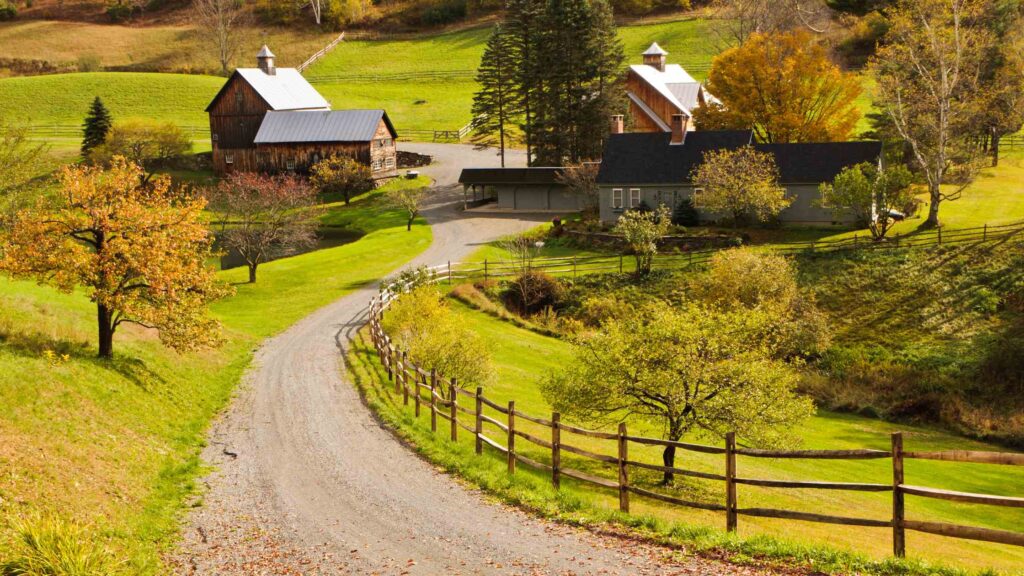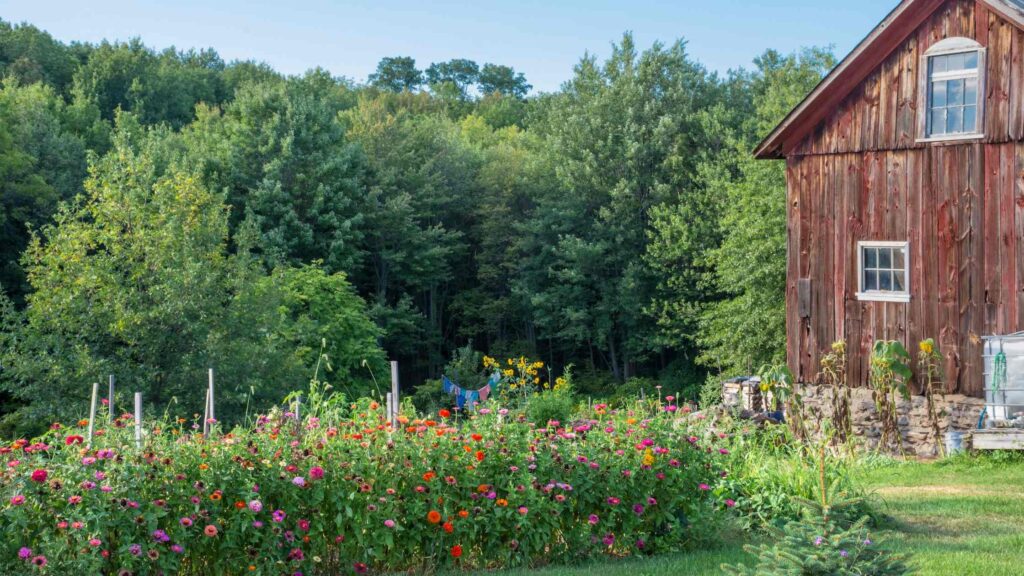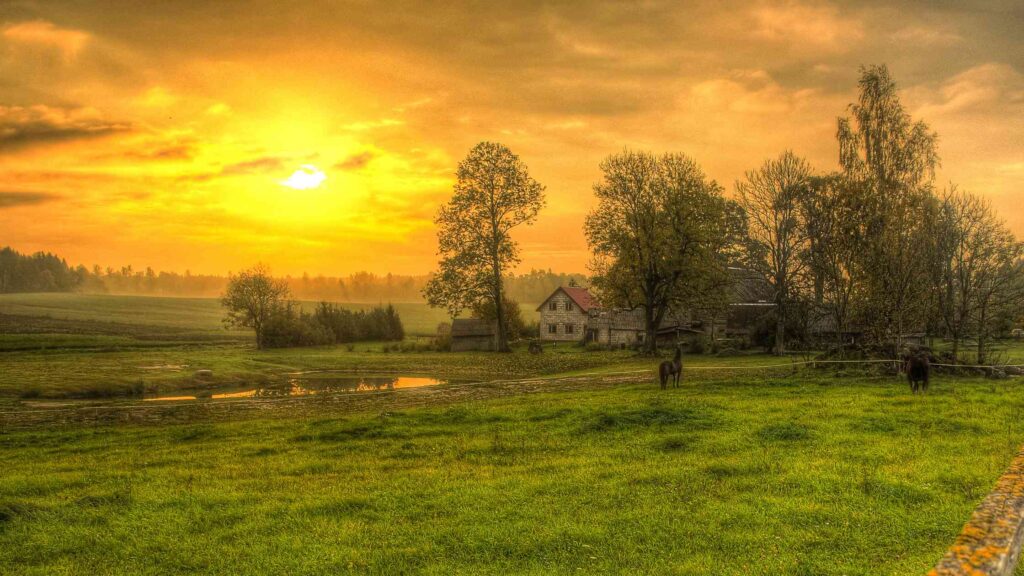When considering what land to purchase before you start your off-grid living venture, it’s important to consider some factors. Every family has different ideas and needs, so it might be worth considering making a pros and cons list and going from there. We narrowed our choices down to two states based on location, water, land price, environment, politics, and weather. Again, every person/family is different, so I’ve made a list of things to consider when deciding where you want to be.
We knew we wanted to be somewhat close to an Amish community for many reasons. Check out this article on why living near an Amish community is beneficial.
You might also want to consider neighboring agriculture. Being close to a commercial agriculture area might pose health risks for your family. We thought we were going to land in Florida, but after moving there, we quickly found out the environmental factors weren’t ideal. They spray mosquito repellant from airplanes without your consent or knowledge and neglect the environmental and health repercussions of fertilizers and chemicals running off the land into the ocean, lakes, and canals. As we appreciated their politics, we weren’t a fan of the lack of stewardship of the land.
Here are

Several factors should be carefully considered when choosing which state to live off-grid.
- Climate: Consider the climate of the state, including temperature extremes, precipitation patterns, and seasonal changes. Ensure that the climate aligns with your off-grid living goals and preferences, especially regarding energy generation (e.g., solar power in sunny states) and agricultural productivity.
- Land Availability and Cost: Research the availability and cost of land in the state, as well as zoning regulations and building codes related to off-grid living. Look for areas with affordable land prices, favorable zoning regulations, and minimal restrictions on alternative housing options (e.g., tiny homes, earthships).
- Natural Resources: Assess the availability of natural resources essential for off-grid living, such as water sources (e.g., wells, springs, rainfall), renewable energy potential (e.g., solar, wind, hydro), and arable land for gardening and farming.
- Self-Sufficiency: Consider the state’s support for self-sufficiency and sustainability practices, including access to local food markets, community-supported agriculture (CSA) programs, and renewable energy incentives or rebates.
- Community and Support Networks: Evaluate the presence of like-minded communities and support networks for off-grid living, such as intentional communities, homesteading groups, and online forums or social media groups.
- Legal and Regulatory Environment: Research state and local laws, regulations, and permitting requirements related to off-grid living, including water rights, waste disposal, land use, and alternative building practices. Ensure compliance with relevant regulations to avoid potential legal issues.
- Infrastructure and Services: Assess the availability of essential infrastructure and services, such as road access, emergency services, healthcare facilities, and educational resources. Consider proximity to towns or cities for accessing goods and services not available off-grid.
- Safety and Security: Consider factors related to safety and security, including crime rates, natural disaster risks (e.g., wildfires, floods), and access to emergency services and community support in case of emergencies.
- Personal Preferences and Lifestyle: Reflect on your personal preferences, lifestyle goals, and priorities for off-grid living, such as proximity to nature, solitude vs. community living, and desired recreational activities (e.g., hiking, fishing, hunting).
By carefully considering these factors, you can choose the state that best aligns with your vision for off-grid living and provides the necessary resources and support for a sustainable and fulfilling lifestyle.

Here’s a list of 15 states known for their suitability for off-grid living:
- Alaska: With vast expanses of wilderness and low population density, Alaska offers abundant opportunities for off-grid living, along with access to natural resources for self-sufficiency.
- Montana: Montana’s wide-open spaces and rugged terrain make it an ideal location for off-grid enthusiasts seeking solitude and independence.
- Wyoming: Wyoming boasts vast tracts of land, favorable zoning regulations, and a low cost of living, making it an attractive option for off-grid living.
- Idaho: With its stunning landscapes, ample natural resources, and relatively low population density, Idaho provides plenty of opportunities for off-grid living.
- New Mexico: New Mexico’s sunny climate and wide-open spaces make it an excellent choice for off-grid living, with plenty of sunshine for solar power and ample opportunities for homesteading.
- Arizona: Arizona offers a warm climate, abundant sunshine, and diverse landscapes, making it an appealing destination for off-grid living and sustainable living practices.
- Texas: Texas boasts vast expanses of land, favorable zoning regulations, and a strong independent streak, making it an attractive option for off-grid enthusiasts.
- Colorado: With its stunning mountain scenery and abundant natural resources, Colorado offers plenty of opportunities for off-grid living and self-sufficiency.
- Oregon: Oregon’s mild climate, abundant water resources, and progressive attitudes make it a popular choice for off-grid living and sustainable communities.
- Washington: Washington’s diverse landscapes, mild climate, and abundant natural resources make it an ideal location for off-grid living and sustainable living practices.
- Maine: Maine’s rugged coastline, abundant forests, and low population density make it an attractive destination for off-grid living and homesteading.
- Vermont: Vermont’s picturesque landscapes, progressive attitudes, and strong local food movement make it a desirable location for off-grid living and sustainable communities.
- New Hampshire: New Hampshire’s low taxes, rural character, and independent spirit make it an appealing destination for off-grid enthusiasts seeking self-sufficiency.
- North Carolina: With its diverse landscapes, mild climate, and strong homesteading community, North Carolina offers plenty of opportunities for off-grid living and sustainable living practices.
- Tennessee: Tennessee’s affordable land prices, favorable zoning regulations, and mild climate make it an attractive option for off-grid living and self-sufficiency.


